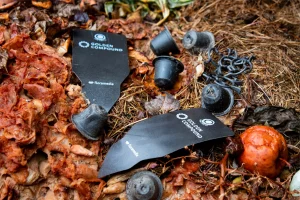Wie moderne Werkstoffe unsere Umwelt schonen, ohne an Funktion einzubüßen
Ein aktueller Test mit Baumschutz-Manschetten liefert eindrucksvolle Antworten. Die Manschetten bestehen aus biologisch abbaubarem Material und umhüllen junge Bäume, um sie vor Wildverbiss zu schützen. Der Test zeigt eindeutig: Der Abbau beginnt nur, wenn Erdkontakt besteht. Solange die Manschette am Baum bleibt, bleibt sie auch stabil. Erst wenn sie zu Boden fällt, setzen Mikroorganismen den Zersetzungsprozess in Gang und wandeln das Material in Wasser, Kohlenstoff und Biomasse um. Das bedeutet, dass keine Rückstände in der Natur zurückbleiben – kein Mikroplastik, kein umweltbelastender Müll.
Der Mythos vom schnellen Zerfall
Viele Menschen beäugen biologisch abbaubare Produkte skeptisch, weil sie befürchten, dass diese zu schnell zerfallen und ihre Funktion nicht erfüllen. Doch das ist ein Missverständnis.
Ein Beispiel: Ein Kaffeebecher aus GC green kann jahrelang in einem Schrank stehen, ohne sich zu verändern. Selbst unter alltäglichen Bedingungen, etwa in der Büroküche oder im Auto, bleibt er stabil und nutzbar. Erst wenn er in die Natur gelangt und dort auf die passenden Umweltbedingungen trifft – Feuchtigkeit, Mikroben und Bodenbakterien –, beginnt der biologische Abbau. Lässt man einen solchen Becher nach einem Campingurlaub in der Natur liegen, sind bereits nach wenigen Wochen erste Abbauerscheinungen sichtbar.
Warum biologischer Abbau sinnvoller ist
Die Umweltvorteile biologisch abbaubarer Produkte liegen auf der Hand:
Kein Mikroplastik: Herkömmliche Kunststoffe zerfallen mit der Zeit in immer kleinere Partikel und verschmutzen Böden und Gewässer. Biologisch abbaubare Materialien hingegen werden durch Mikroorganismen komplett zersetzt.
Natürlicher Kreislauf: Die Zersetzungsprodukte gehen in den natürlichen Stoffkreislauf über, ohne schädliche Rückstände zu hinterlassen.
Einfache Entsorgung über die Restmülltonne: Biologisch abbaubare Produkte wie unsere GC green Materialien können auch über die Restmülltonne entsorgt werden. In modernen Müllverbrennungsanlagen wird daraus wertvolle Energie gewonnen, während die Materialien aus nachwachsenden Rohstoffen stammen und somit eine nachhaltige Alternative darstellen.
Nachhaltigkeit ohne Kompromisse
Biologisch abbaubare Materialien sind eine echte Alternative zu herkömmlichem Plastik. Sie bieten dieselbe Funktion und Haltbarkeit, ohne die Umwelt langfristig zu belasten. Produkte wie die Baumschutzhüllen oder Kaffeebecher aus GC green beweisen: Nachhaltigkeit muss nicht heißen, auf Qualität zu verzichten. Vielmehr bedeutet es, Materialien zu verwenden, die sich dann abbauen, wenn sie nicht mehr gebraucht werden – und das auf vollkommen natürliche Weise.
Wer sich für biologisch abbaubare Produkte entscheidet, setzt ein Zeichen für eine saubere Zukunft. Keine Spuren, kein Plastikmüll, stattdessen ein nachhaltiger Kreislauf. Ein Konzept, das einfach sinnvoll ist.





